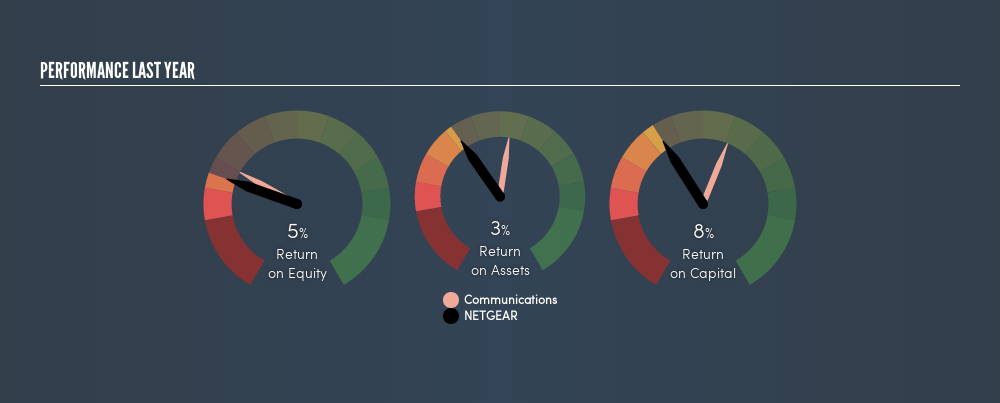- United States
- /
- Communications
- /
- NasdaqGS:NTGR
Should You Be Worried About NETGEAR, Inc.'s (NASDAQ:NTGR) 4.7% Return On Equity?
While some investors are already well versed in financial metrics (hat tip), this article is for those who would like to learn about Return On Equity (ROE) and why it is important. We'll use ROE to examine NETGEAR, Inc. (NASDAQ:NTGR), by way of a worked example.
NETGEAR has a ROE of 4.7%, based on the last twelve months. Another way to think of that is that for every $1 worth of equity in the company, it was able to earn $0.047.
See our latest analysis for NETGEAR
How Do I Calculate Return On Equity?
The formula for return on equity is:
Return on Equity = Net Profit ÷ Shareholders' Equity
Or for NETGEAR:
4.7% = US$29m ÷ US$622m (Based on the trailing twelve months to June 2019.)
It's easy to understand the 'net profit' part of that equation, but 'shareholders' equity' requires further explanation. It is all the money paid into the company from shareholders, plus any earnings retained. The easiest way to calculate shareholders' equity is to subtract the company's total liabilities from the total assets.
What Does Return On Equity Mean?
ROE measures a company's profitability against the profit it retains, and any outside investments. The 'return' is the yearly profit. A higher profit will lead to a higher ROE. So, all else being equal, a high ROE is better than a low one. That means ROE can be used to compare two businesses.
Does NETGEAR Have A Good ROE?
Arguably the easiest way to assess company's ROE is to compare it with the average in its industry. The limitation of this approach is that some companies are quite different from others, even within the same industry classification. If you look at the image below, you can see NETGEAR has a lower ROE than the average (6.9%) in the Communications industry classification.

That certainly isn't ideal. We'd prefer see an ROE above the industry average, but it might not matter if the company is undervalued. Nonetheless, it might be wise to check if insiders have been selling.
The Importance Of Debt To Return On Equity
Virtually all companies need money to invest in the business, to grow profits. That cash can come from retained earnings, issuing new shares (equity), or debt. In the first and second cases, the ROE will reflect this use of cash for investment in the business. In the latter case, the use of debt will improve the returns, but will not change the equity. In this manner the use of debt will boost ROE, even though the core economics of the business stay the same.
NETGEAR's Debt And Its 4.7% ROE
Shareholders will be pleased to learn that NETGEAR has not one iota of net debt! Even though I don't think its ROE is that great, I think it's very respectable when you consider it has no debt. At the end of the day, when a company has zero debt, it is in a better position to take future growth opportunities.
In Summary
Return on equity is one way we can compare the business quality of different companies. A company that can achieve a high return on equity without debt could be considered a high quality business. If two companies have the same ROE, then I would generally prefer the one with less debt.
But when a business is high quality, the market often bids it up to a price that reflects this. The rate at which profits are likely to grow, relative to the expectations of profit growth reflected in the current price, must be considered, too. So you might want to check this FREE visualization of analyst forecasts for the company.
Of course, you might find a fantastic investment by looking elsewhere. So take a peek at this free list of interesting companies.
We aim to bring you long-term focused research analysis driven by fundamental data. Note that our analysis may not factor in the latest price-sensitive company announcements or qualitative material.
If you spot an error that warrants correction, please contact the editor at editorial-team@simplywallst.com. This article by Simply Wall St is general in nature. It does not constitute a recommendation to buy or sell any stock, and does not take account of your objectives, or your financial situation. Simply Wall St has no position in the stocks mentioned. Thank you for reading.
About NasdaqGS:NTGR
NETGEAR
Provides connectivity solutions the Americas; Europe, the Middle East, Africa; and the Asia Pacific.
Very undervalued with flawless balance sheet.
Similar Companies
Market Insights
Community Narratives



